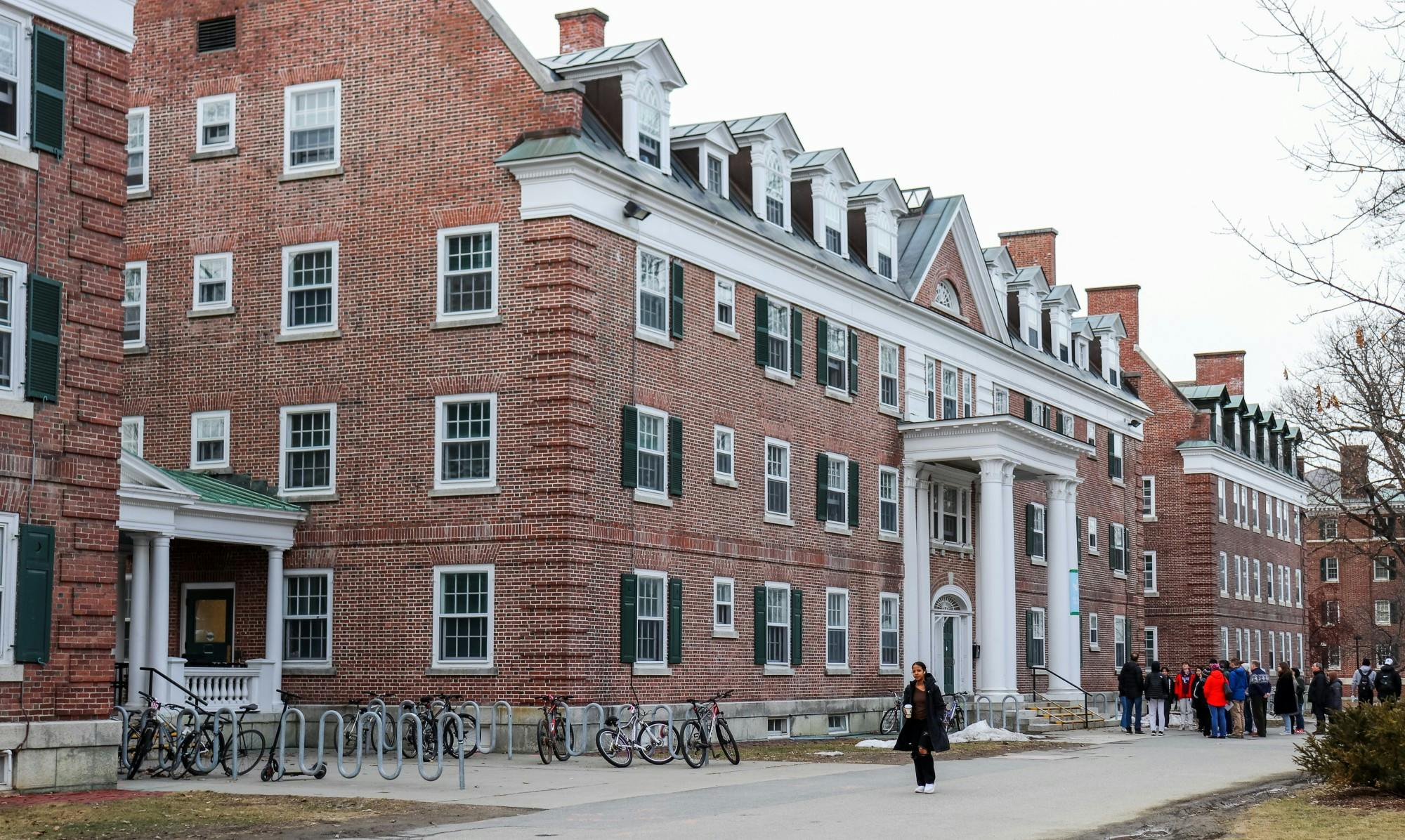This spring, all undergraduate students living in campus housing can access all residence halls 24 hours a day using their Dartmouth IDs, according to Dartmouth Student Government president David Millman ’23. Previously, students could no longer access residence halls outside their own house community after midnight. Universal residence hall access will last until the end of the spring term, when the College will reevaluate the policy, according to Millman.
Unrestricted access was last permitted in 2019 but was curtailed by the College after a series of racial bias and vandalism incidents during the 2018-2019 school year, the email wrote. Students responded with sharp backlash to the initial restrictions, with more than 2,900 individuals — around two-thirds of the student body — signing a petition in opposition, according to past reporting by The Dartmouth.
Ultimately, administrators agreed to open up residence halls as a pilot program this spring, with its continuation contingent on students’ respect for living spaces.
“We are always looking for ways to connect and support our students and have worked closely with DSG in thinking about ways to do so,” Dean of the College Scott Brown wrote in an emailed statement. “We are hoping to see this pilot as a way to welcome students in other spaces, and that students hold each other accountable for respecting those spaces and the people who work and live in them.”
Millman said the pilot policy responds to continued student support for universal residence hall access — noting that a “large majority” of students said 24-hour access would be “extremely helpful to campus” in the DSG Student Issue Survey Report sent in November 2022.
Millman added that his commitment to the cause was largely sparked by a personal experience with the former restrictions, in which he was unable to help a friend in need.
“We were using a [Good Samaritan call] on someone, and they ran into their residence hall, and it was past 12 [a.m.] so we couldn’t get in,” Millman said. “If Dartmouth wants to facilitate a community of care, part of that care has to be open access to support our peers … Having dorm access restricted … just didn’t feel like it was the best policy for the safety of students.”
Under the revised policy, Millman said the College will still restrict access during Green Key weekend and the weekend of May 6, when spring activities such as Pigstick and Mudpit — annual parties where a pig is roasted at Alpha Chi Alpha fraternity and students play in a mud pit in the Bones Gate fraternity’s backyard, respectively — typically occur. He added that universal access will also be limited to students enrolled in classes and living in on-campus housing. The revised policy will not permit access to Greek houses, he said.
According to Millman, discussions between DSG, Residential Life, Residential Operations and Student Affairs began in the fall of 2022. Millman said he initially faced some “pushback” from administrators, who worried universal residence hall access could “unduly burden the custodial staff.” Administrators also claimed that previous DSG representatives had supported the restrictions — a notable point of contention after the 2019 decision, Millman said.
Students responded generally positively to the change, noting that universal access could improve student safety and convenience.
Daniel Lin ’23, an undergraduate advisor in McLaughlin Hall, said 24-hour access — which he had prior to this term’s policy change due to his role as a UGA — has helped with “practical things” like taking shortcuts through buildings to avoid the cold during the winter or using the restroom. He added that he did not understand the College’s initial motivation to restrict residence hall access in 2019.
“Honestly, it didn’t make a lot of sense to me because if someone wanted to be racist, they could do that anywhere and they don’t really need … card access to do it,” Lin said.
Ben Barris ’25 said he agreed that universal access could help with day-to-day inconveniences, such as spending time with friends late at night.
“Last term, for instance, I would go out or whatever and then go to my friend’s dorm super late, 1 or 2 or 3 [a.m.],” Barris said. “It was very inconvenient, especially during the cold, to be like, ‘Yo, let me in.’”
Barris added that he does not think the policy will impact cleanliness in residence halls, noting that students already could access other buildings using a friend’s ID or by waiting for the door to open.
Ali Bauer ’25, a UGA in Brown Hall, said she thinks the policy will have both positive and negative impacts. While Bauer said she recognized that universal access may increase traffic and vandalism in residence halls, especially in “hotspots” such as Massachusetts Hall, she said issues will largely depend on advertisement — noting that students may not even realize they have universal access.
She added that 24-hour access could be useful during extreme cold or a mental health crisis.
“If someone calls and is like, ‘I need help now,’ the friend or whoever is called, no matter what house they’re in, can just go [with] 24-hour access,” Bauer said. “[Without] 24-hour access, it could be really challenging for somebody who needs help to walk downstairs and unlock someone or find someone.”
Millman said he expects the pilot program to be successful, explaining that he only anticipates two extra hours of foot traffic per night — from midnight to 2 a.m.
“Maybe it becomes something where we have to reevaluate it, but I think it’s also just an opportunity for us to really take a step back and appreciate our custodial staff and the people that keep campus running,” he said. “I think it will be successful, but I do think every student has a role to play in making sure that it’s a success.”
Representatives from Residential Life and Residential Operations did not respond to requests for comment by the time of publication.




